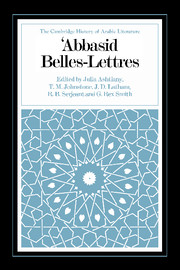Book contents
- Frontmatter
- The ʿAbbasid Caliphate: a historical introduction
- 1 Adab and the concept of belles-lettres
- 2 Shuʿūbiyyah in Arabic literature
- 3 Ibn al-Muqaffaʿ and early ʿAbbasid prose
- 4 Al-Jāḥiẓ
- 5 Al-Ṣaḥib Ibn ʿAbbād
- 6 Abū Ḥayyān al-Tawḥīdī
- 7 Al-Hamadhānī, al-Ḥarīrī and the maqāmāt genre
- 8 Fables and legends
- 9 ʿAbbasid poetry and its antecedents
- 10 Hunting poetry (ṭardiyjāt)
- 11 Political poetry
- 12 Love poetry (ghazal)
- 13 Wine poetry (khamriyyāt)
- 14 Mystical poetry
- 15 Ascetic poetry (zuhdiyyāt)
- 16 Bashshār b. Burd, Abū ʾl-ʿAtāhiyah and Abū Nuwās
- 17 Al-Mutanabbī
- 18 Abū Firās al-Ḥamdānī
- 19 Abū ʾl-ʿAlāʾ al-Maʿarrī
- 20 Literary criticism
- 21 Ibn al-Muʿtazz and Kitāb al-Badīʿ
- 22 Regional literature: Egypt
- 23 Regional literature: the Yemen
- Appendix: Table of metres
- Bibliography
- Index
21 - Ibn al-Muʿtazz and Kitāb al-Badīʿ
Published online by Cambridge University Press: 28 May 2012
- Frontmatter
- The ʿAbbasid Caliphate: a historical introduction
- 1 Adab and the concept of belles-lettres
- 2 Shuʿūbiyyah in Arabic literature
- 3 Ibn al-Muqaffaʿ and early ʿAbbasid prose
- 4 Al-Jāḥiẓ
- 5 Al-Ṣaḥib Ibn ʿAbbād
- 6 Abū Ḥayyān al-Tawḥīdī
- 7 Al-Hamadhānī, al-Ḥarīrī and the maqāmāt genre
- 8 Fables and legends
- 9 ʿAbbasid poetry and its antecedents
- 10 Hunting poetry (ṭardiyjāt)
- 11 Political poetry
- 12 Love poetry (ghazal)
- 13 Wine poetry (khamriyyāt)
- 14 Mystical poetry
- 15 Ascetic poetry (zuhdiyyāt)
- 16 Bashshār b. Burd, Abū ʾl-ʿAtāhiyah and Abū Nuwās
- 17 Al-Mutanabbī
- 18 Abū Firās al-Ḥamdānī
- 19 Abū ʾl-ʿAlāʾ al-Maʿarrī
- 20 Literary criticism
- 21 Ibn al-Muʿtazz and Kitāb al-Badīʿ
- 22 Regional literature: Egypt
- 23 Regional literature: the Yemen
- Appendix: Table of metres
- Bibliography
- Index
Summary
The foregoing chapter offered a general survey of ʿAbbasid literary theory and criticism, described some of their basic concerns and discussed a number of major critics. It must always be remembered, however, that the background to much ʿAbbasid criticism is still far from having been exhaustively researched, and this must be borne in mind in any attempts at interpretation. A case in point is one of the most notable works of Arabic criticism, Ibn al-Muʿtazz's (d. 296/908) Kitāb al-Badīʿ. This chapter will discuss some of the technical problems surrounding the use of this text.
MODERN STUDIES OF KITĀB AL-BADĪʿ
At the time of its appearance in 1935, the edition by I. Kratchkovsky of Kitāb al-Badīʿ did not receive the attention it deserved. Only in the years following the Second World War have scholars become fully aware of the importance of this publication, which brought to light one of the first, and certainly the most fundamental, work of a genre that was to be amongst the most brilliant achievements of medieval Muslim scholarship. In the introduction to his edition, Kratchkovsky made a significant attempt to shed light on the early history of Arabic rhetoric. A further contribution by Kratchkovsky dealing with the terminology of Ibn al-Muʿtazz and the history of Arabic rhetoric in general was published posthumously in 1960 in the edition of his collected works, and appeared in a French translation in 1962. In addition to reviews published in the late thirties, there were some incidental observations on the book in the fifties by G. von Grunebaum, H. Ritter, and the present writer; more thorough studies were conducted in the next two decades, notably by W. Heinrichs.
- Type
- Chapter
- Information
- Abbasid Belles Lettres , pp. 388 - 411Publisher: Cambridge University PressPrint publication year: 1990
- 1
- Cited by



